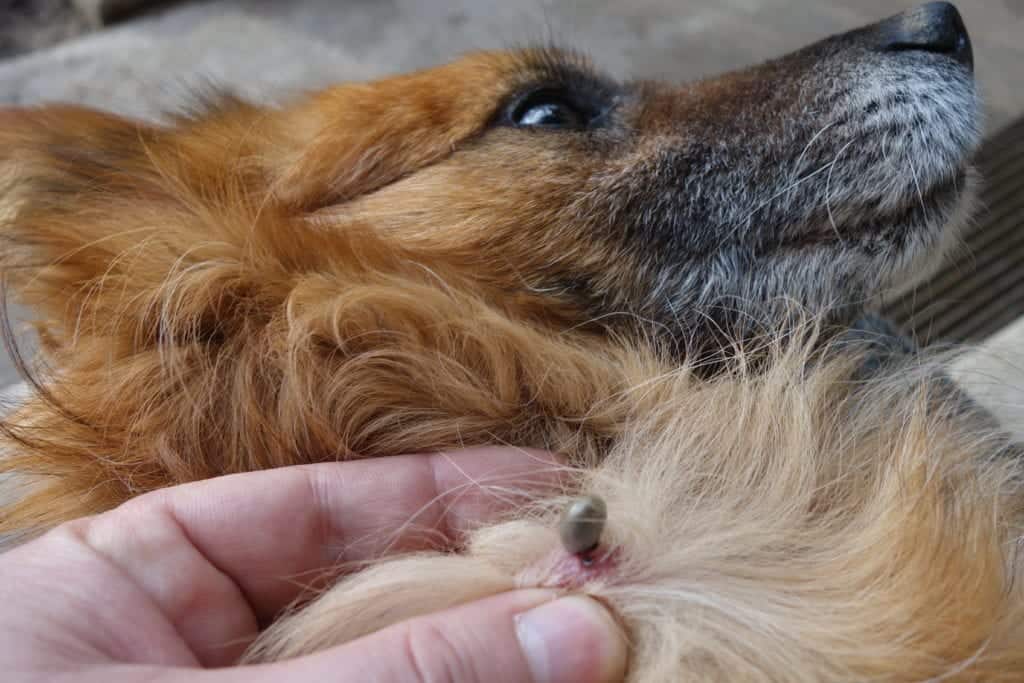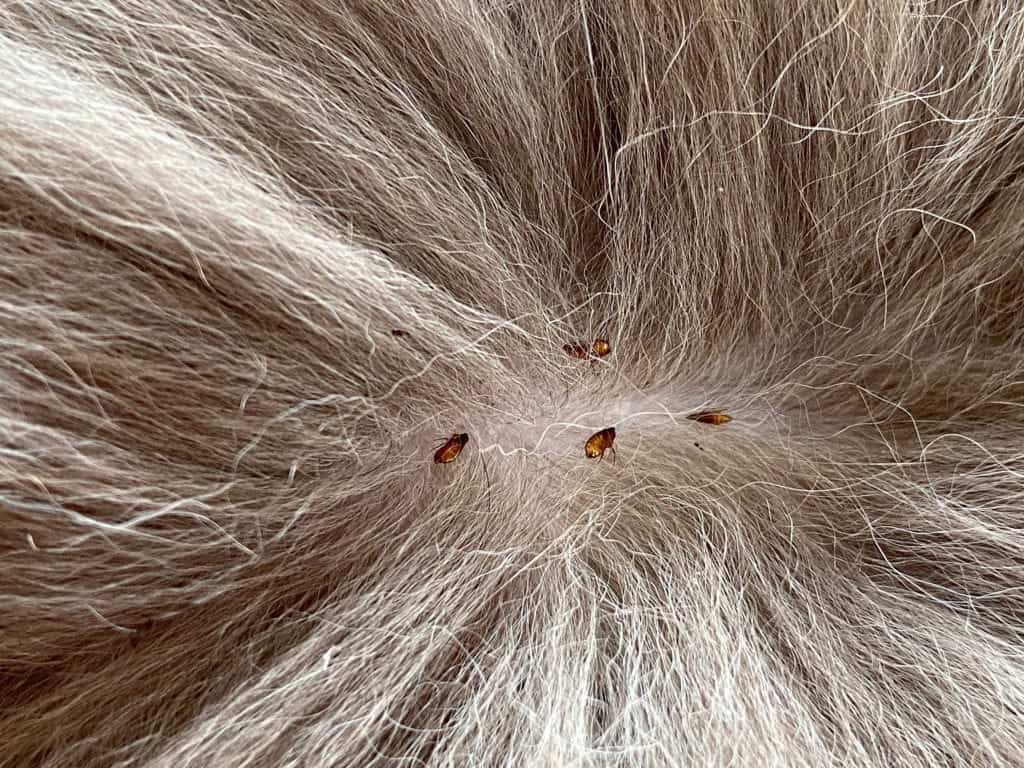Pests on Your Pets – Bugs that May be Bugging Your Furry Friends
Pests on Your Pets – Bugs that May be Bugging Your Furry Friends
Ticks
In the unfortunate case that your little buddy gets stuck with one of these ectoparasites (ie. external parasites – living and feeding outside of their host), you will want to remove it as soon as possible. Ticks can transmit terrible diseases including Lyme disease which can infect both humans and pets. Also, if a tick is left feeding undisturbed for long enough, your dog or cat may be at risk of tick paralysis. This is why it is incredibly important to check your pet for ticks after spending any time outside. For tips on how to properly remove a tick from your furry friends, click here. 
Fleas
Fleas love to feast on the blood of our beloved furry friends. They are nasty external parasites and are made up of 2,500 different subspecies, the most prominent of which in the U.S. is the Ctenocephalides felis… also known as the “cat flea,” though, this is a misnomer as these fleas most commonly infect dogs. When fleas bite, their saliva is injected into the dermis of their victims which can cause several problems for dogs and cats. The most common reaction is an immune response called flea allergy dermatitis (FAD), which results in intense itchiness and skin irritation. In other severe cases, when various fleas are attacking one host, your dog or cat could be at risk of developing a very serious medical condition: anemia. If your pet is developing anemia, you may notice increased lethargy, labored and/or rapid breathing, and weakness – all signs that your furry friend requires immediate medical intervention. If left untreated, this flea-induced condition can unfortunately even lead to death. Some fleas are also internally infested with the eggs of tapeworms which can cause further problems for Fido or Fluffy. If your unsuspecting dog or cat reacts to the itchy bite of these insects and nips or licks the area to try and sooth the itch, they may accidentally ingest the infected flea, leading to an interior parasite as well as their annoying external biters. Once in the digestive system of your pet, the eggs of the tapeworm will hatch and begin to latch on to the intestinal lining of your furry friend. This can cause weight loss, changes in appetite, discomfort, vomiting, irregular bowel excretions, and diarrhea. Luckily, these additional parasites are very easily treated by a veterinarian and you can also consult your vet about ongoing flea and tick protection for your furry family members as a preventative measure for all of these problems. 
Spiders
The two most common poisonous spiders in the United States are the black widow and brown recluse. If either of these arachnids bite your pet, you will want to seek veterinary assistance immediately. Signs that a black widow has bit your furry friend include:
- A pain reaction and licking or rubbing on the site of the bite
- Mild redness at bite site
- Swelling at bite site
- Muscle cramping or rigidity
- Vomiting and/or diarrhea
- Indications of pain in the abdomen
- Tremors
- Overall agitation
While the black widow bite is initially painful, the bite of the brown recluse is typically less so for pets. Symptoms that this awful arachnid has encountered your poor pet include:
- Mild redness at bite site
- A blister developing withing 2-8 hours of the bite
- A “bulls-eye” shaped lesion at the site
- Fever
- Lethargy
- Darkening tissue/tissue death
- Kidney abnormalities
- Clotting
Regardless of the severity of the symptoms, it is always wise to seek veterinary assistance immediately to help your pet avoid any excessive pain, damage to their health/wellbeing, or even death. 
Bees/Wasps
Curious kittens and rambunctious pups beware… chasing that little bee or wasp may seem harmless to them but can end disastrously if they are stung. As with humans, some pets may barely have a reaction if stung while others have the potential of facing a serious and potentially fatal reaction. If you know your furry friend has been stung, make sure to monitor him or her very closely for any warning signs of an allergic reaction. These signs include:
- Swelling (particularly around the head or neck)
- Rash
- Watery eyes
- Weakness or collapsing
- Dizziness or disorientation
- Vomiting or diarrhea
- Seizures
- Respiratory Distress
In the case of any of these reactions it is always important to seek veterinary treatment and advice, and, in very serious cases, it is advisable to bring your pet to an emergency veterinary clinic as soon as possible. If your furry friend’s reaction to a sting is minor. You can still seek advice from your veterinarian regarding how to soothe the site of the sting, reduce injury from scratching the area, and, in the case of bees, how to find and remove the stinger. 
Bed Bugs
Just like they bite us, bed bugs are more than happy to make a feast of your furry friends. Luckily, no diseases have been known to be spread to pets by bed bugs so, while it may be a nuisance to both you and your furry family members, they’re luckily not dangerous. If you suspect or know you have bed bugs in your home, it is important to check your pet’s bedding, cat trees, etc., as bed bugs may be hiding in these areas. 
Mosquitos
As with bed bugs, mosquitos are somewhat indiscriminate biters and are more than happy to make a blood meal out of Fluffy or Fido. For humans, mosquitos can transmit some disastrous diseases including Zika virus, Yellow Fever, West Nile virus, and Malaria. Similarly, mosquitos can infect pets with other dangerous diseases such as heartworm. If left untreated, heartworm can be extremely detrimental and even fatal to the health of your beloved pet, so it is important to be aware of the warning signs so that you can seek proper treatment. The parasite typically causes:
- Lethargy
- Coughing or respiratory distress
- Vomiting
- Disorientation
- Loss of consciousness
- Exercise intolerance
Luckily, prevention is rather easy with heartworm medication, making mosquito bites far less threatening to your dog or cat. They may still display frustration, however, because those little biters are still super annoying and itchy for all of us. 
Citations
11 Bugs to Watch Out For If You Have Pets (2017) American Pest. Available at: https://www.americanpest.net/blog/post/11-bugs-to-watch-out-for-if-you-have-pets (Accessed: September 2020). Barnette, C. DVM Spider Bites, VCA Hospitals. Available at: https://vcahospitals.com/know-your-pet/spider-bites (Accessed: September 2020). Buzhardt, L. DVM First Aid for Insect Stings in Cats, VCA Hospitals. Available at: https://vcahospitals.com/know-your-pet/first-aid-for-insect-stings-in-cats (Accessed: September 2020). Dr. Nicholas, J. (2019) How to Remove a Tick from Your Dog or Cat – What to Do and What NOT to Do, Preventive Vet. Available at: https://www.preventivevet.com/dogs/how-to-remove-a-tick-from-your-dog-or-cat (Accessed: June 2020). The Hidden Dangers of Flea Bites: What to Look For (no date) The Associated Press. Seresto. Available at: https://apnews.com/sponsored/?prx_t=z40EAq48yAniAPA&prx_ro=s&ntv_fpc=671dc30c-79c6-4e77-b41f-040c722e9642&ntv_fr (Accessed: September 2020). Hill, C. and MacDonald, J. (2008) Fleas, Purdue University . Purdue’s College of Agriculture: Entomology Department. Available at: https://extension.entm.purdue.edu/publichealth/insects/flea.html (Accessed: September 2020). Mosquito Bites and Your Dog (no date) Hartz. The Hartz Mountain Corporation. Available at: https://www.hartz.com/mosquito-bites-and-your-dog/ (Accessed: September 2020). Tapeworms in Cats 101 (2020) Chewy Pet Central. Available at: https://petcentral.chewy.com/tapeworms-in-cats/ (Accessed: September 2020). Ticks and Tick Removal (2018) International Cat Care. Available at: https://icatcare.org/adive/ticks-and-tick-removal/(Accessed: June 2020).
Request a Free Quote Today
(We do not share your data with anybody, and only use it for its intended purpose)


